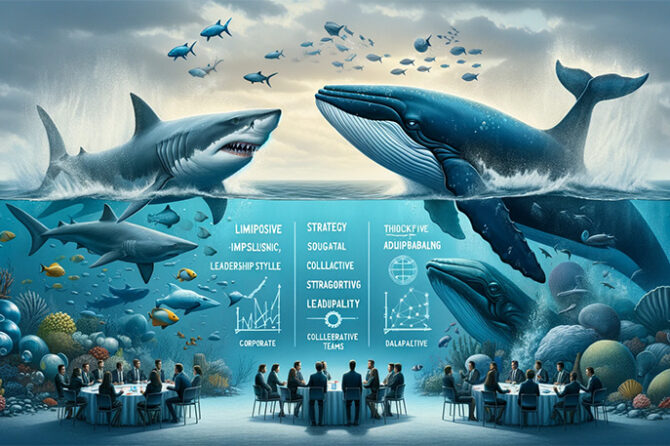
Imagine the vast expanse of the ocean, an unforgiving realm where survival hinges on strategy and resilience. Within this domain, two behemoths reign: the shark, a sleek predator of instinct, and the whale, a gentle giant honed by wisdom and community. These aquatic titans serve as powerful metaphors for leadership, prompting us to ask: are you a shark who charges forth impulsively, or a whale who leads through calculated purpose and collective might?
David Grossman, in his poignant article “Leadership Styles: Do you lead like a shark or a whale?”, draws striking parallels between these marine giants and our own leadership styles. The shark, nimble and solitary, relies on surprise attacks and opportunistic feeding. While this approach can yield immediate results, it lacks sustainability and often carries unpredictable consequences. Just as sharks can stumble upon unexpected dangers lurking in the deep, leaders who solely rely on instinctual decisions risk encountering unforeseen pitfalls and jeopardizing their team’s progress.
In stark contrast, the whale embodies a symphony of collaboration and planning. These majestic creatures move in pods, sharing knowledge and adapting their hunting techniques to navigate shifting currents and prey patterns. Their success stems from a focus on the collective good, prioritizing strategy and adaptation over brute force. As John C. Maxwell, renowned leadership expert, aptly states, “A leader is one who knows the way, goes the way, and shows the way.” The whale exemplifies this philosophy, paving the path for its pod through shared wisdom and learned experience.
Grossman encourages us to embrace the whale’s guiding principles, urging us to be planful, outcome-oriented, and adaptable. Leading with a clear vision and actionable strategies minimizes the turbulence of unforeseen challenges. As Jim Collins, author of the seminal leadership book “Good to Great“, emphasizes, “Vision without execution is hallucination.” By aligning actions with well-defined goals, whale-like leaders steer their teams towards shared achievements, avoiding the aimless meanderings of their shark counterparts.
Furthermore, the whale shines as a beacon of teamwork and mentorship. By cultivating a collaborative environment where knowledge flows freely and individuals feel empowered to contribute, leaders foster an ecosystem of mutual growth and resilience. Nelson Mandela, a quintessential whale-leader, embodied this spirit, declaring, “Education is the most powerful weapon which you can use to change the world.” Just as whales nurture their young, effective leaders invest in the development of their team members, recognizing that their own success is inextricably linked to the collective well-being.
Of course, the ocean demands both calculated manoeuvres and bursts of decisive action. There are times when even the most prudent whale must react swiftly to evade a predator or seize an unexpected opportunity. The key lies in striking a balance between strategic planning and agile adaptation. As Winston Churchill, a leader who navigated tumultuous seas himself, once remarked, “Plans are nothing; planning is everything.” It is the ongoing process of adaptation, informed by deliberation and a keen awareness of the changing environment, that separates the effective leaders from the impulsive followers.
So, the next time you find yourself at the helm, ask yourself: do you navigate like a shark, driven by instinct and individual prowess, or do you chart your course like a whale, guided by shared knowledge and an unwavering commitment to a collective future? Remember, the most magnificent vessels in the ocean’s vast embrace are not forged from aggression and solitary pursuit, but from the harmonious convergence of purpose, collaboration, and adaptability. So, choose your course wisely, embrace the spirit of the whale, and lead your team to shores of lasting success.
Further Inspiration:
- Books:
- “Leadership: Hard Truths for Tough Times” by James C. Hunter.
- “Dare to Lead” by Brené Brown.
- “The Leadership Gap” by Lolly Daskal.
- Articles:
- “The Five Levels of Leadership: Hierarchy of Needs” by John C. Maxwell,
- “Whale Wisdom: What Leaders Can Learn from These Gentle Giants” by Forbes,
- “Leading by Example: The Whale Way” by Harvard Business Review
May your journey be guided by the wisdom of the ocean and your leadership leave a ripple of positive impact that echoes throughout the depths of time.
Prof. Dr. Prahlada N. B
28 December 2023
Mogadishu, Somalia.

















Leave a reply